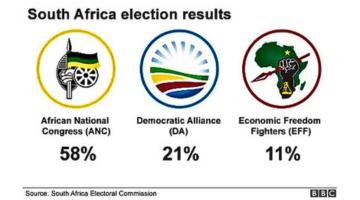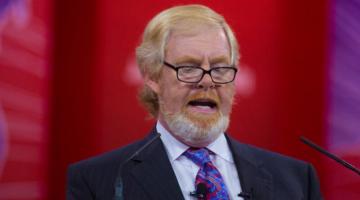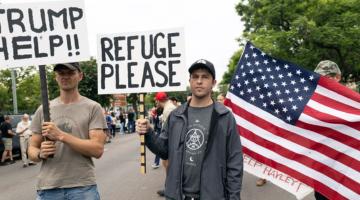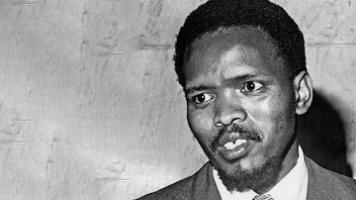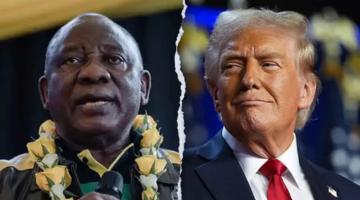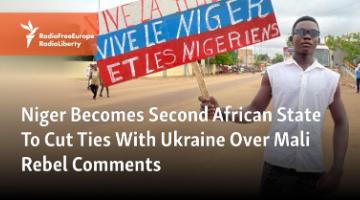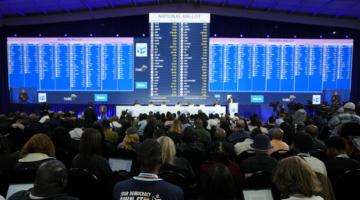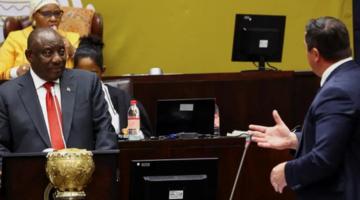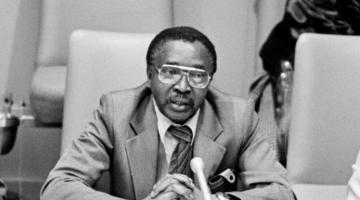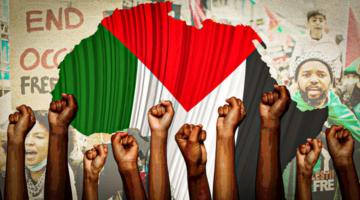Russia's President Vladimir Putin, left, and South Africa's President Cyril Ramaphosa attend a signing ceremony on the sidelines of the BRICS summit in Johannesburg, South Africa July 26, 2018 (Photo: Alexei Nikolsky/Kremlin via Reuters)
Washington continues to pressure African states over their relations with the Russian Federation and the war in Ukraine.
Originally published in News Ghana.
Geopolitical Analysis
Two international issues have surfaced which are further aggravating diplomatic ties between the United States and the Republic of South Africa.
The Brazil, Russia, India, China and South Africa (BRICS) Summit is scheduled to be held in Cape Town in August where important joint economic projects among these states which expand several geopolitical regions are to be discussed.
BRICS is an important new development in the quest to strengthen ties between states within the Global South where the Russian Federation has established firm ties with the emerging post-colonial countries. None of the existing members of BRICS have condemned the special military operation being carried out by Moscow in neighboring Ukraine.
The general approach to the conflict is to encourage the resolution of differences which have led to the war through negotiations. This position has placed the administration of President Joe Biden at loggerheads with those governments representing populations which far outnumber the United States.
As a by-product of the strained character of relations between Pretoria and Washington, are recent allegations by the Biden administration that South Africa is supplying arms to the Russian Federation for use in Ukraine. The South African government has categorically denied these charges citing the hypocrisy of U.S. foreign policy.
ICC Hypocrisy and U.S.-South African Relations
With specific reference to the International Criminal Court (ICC) indictments against President Vladimir Putin, the evidence stems from what is said to be the removal of children from Ukraine into Russia. The intervention of the U.S. under the previous administration of President Barack Obama during 2014 created enormous tensions in the eastern Russian-speaking regions known as the Donbass. Resistance to the right-wing anti-Russian regime which was installed in Kiev in 2014 has led to the existing crisis prompting the intervention by Moscow.
The ICC grew out of the Rome Statute which was adopted by 120 states at a conference during 1998 in Italy. The court went into effect in July 2002. South Africa as a signatory of the Rome Statute has debated on a parliamentary level for years over whether to withdraw its endorsement of the document and its membership within the ICC based in The Netherlands. One major criticism of the ICC is that its prosecutorial history has focused almost exclusively on African heads-of-state and rebel leaders. There has never been any serious investigation into the crimes committed by the imperialist states during wars of aggression and occupation in various geopolitical regions in Africa, the Caribbean, Latin America, the Middle East and the Asia-Pacific.
Moreover, the U.S., China, Russia, among other states are not signatories of the Rome Statute and should not be bound by the arbitrary prosecutorial behavior of the ICC. Nonetheless, the U.S. has repeatedly utilized the ICC as a propaganda mechanism to advocate and initiate regime change within countries which they consider adversaries or impediments to the foreign policy imperatives of Washington and Wall Street.
The requirements of ICC membership mandate that Putin be arrested if he visited any country which is a signatory to the Rome Statute. This same problem arose in 2016 when former President of the Republic of Sudan, Omer Hassan al-Bashir, visited South Africa for an African Union (AU) Summit. South Africa refused to arrest the then president saying that the diplomatic protocols of the continental AU superseded the Rome Statute and the ICC warrants against al-Bashir.
South African Minister of Justice, Ronald Lamola, spoke out recently before the Parliament in Cape Town against the ICC saying:
“The fact that an investigation into the atrocities in Palestine has not been completed while the one in Ukraine, opened later, already has a referral against a non-member state is an injustice. We will explore various options with regard to how the Rome Statute was domesticated in our country including the option to look at extending customary diplomatic immunity to visiting heads of state in our country.”
There have been contradictory reports over whether the ruling African National Congress (ANC) is prepared to withdraw from the ICC. The ANC secretary general and President Cyril Ramaphosa made statements in late April after a National Executive Committee (NEC) meeting that the government would withdraw from the court.
According to a quote published in the same above-mentioned report:
“At the end of April, Fikile Mbalula, secretary-general of the governing African National Congress (ANC) told the media that it was ‘hypocritical’ to think that the country will arrest Putin and it would withdraw from the ICC. ‘This ICC does not serve the interest of all, it serves a few,’ Mbalula said. President Cyril Ramaphosa also initially supported his party’s stance. ‘Yes, the governing party has taken the decision that it is prudent that South Africa should pull out of the ICC, largely because of the manner in which the ICC has been seen to be dealing with these types of problems,’ he told the media during a state visit of Finnish President Sauli Niinisto in March. ‘Our view is that we would like this matter of unfair treatment to be properly discussed,’ Ramaphosa said. ‘But in the meantime, the governing party has decided once again that there should be a pull-out, so that will be a matter that will be taken forward.’”
However, soon after these reports were made public in the press, there were retractions by Ramaphosa saying that a decision had not been made. Six years earlier in 2017, the ANC government decided to withdraw from the Rome Statute and the ICC. Later a High Court decision said the move was unconstitutional and the plan to leave was abandoned.
Allegations of Arms Sales to Russia
Another major problem complicating relations between Pretoria and Washington are the charges made by the U.S. Ambassador to South Africa claiming that arms are being supplied to Moscow. South Africa has denied these allegations, yet the manner in which the charges were made by the U.S. embassy has created a diplomatic row.
The Financial Times newspaper says that the issue was raised by the U.S. in February. South Africa does have military ties with Russia. Earlier in 2023, there were joint naval exercises between South Africa, the People’s Republic of China and the Russian Federation. These drills were carried out in defiance of the implicit threats by the Biden administration against the ANC government. This entire affair undoubtedly is a direct result of the failures of U.S. efforts to win over countries of the Global South to support its position on Ukraine which has served to continue the war by refusing to back a diplomatic solution.
The article in the Financial Times emphasizes:
“The U.S. has accused South Africa of supplying arms to Russia in a covert naval operation, escalating a foreign policy crisis for President Cyril Ramaphosa over the country’s ties to the Kremlin and position on the Ukraine war. Reuben Brigety, U.S. ambassador to South Africa, told local media on Thursday (May 11) that the U.S. believed weapons and ammunition were loaded on to the Lady R, a Russian vessel under sanctions that docked at Simon’s Town naval dockyard near Cape Town in December…. U.S. anger highlights the mounting tensions between the west and countries that have refused to condemn Russia over the war or join sanctions efforts. Like South Africa, India has continued to regard Russia as a friendly nation and western diplomats have struggled to convince developing nations across Africa and Asia to back Ukraine. Brigety also criticized a resolution from the ruling African National Congress, which said ‘the U.S. provoked the war with Russia over Ukraine.’”
Such a charge by the U.S. against South Africa speaks volumes in regard to the reality of the world arms trade. The U.S. by far exceeds all other states around the world in the trafficking of weapons and ammunition.
Washington maintains hundreds of military bases and special operations throughout Africa, Latin America and the Asia-Pacific. Working class and oppressed peoples in the U.S. are burdened by the huge Pentagon and Intelligence budgets which exceed 1 trillion dollars annually.
Scores of occupations, covert operations and proxy wars are being conducted by the Pentagon, Central Intelligence Agency (CIA) and State Department functionaries. The International Monetary Fund (IMF), the World Bank and other U.S.-based financial institutions are responsible for the immiseration of billions across the globe.
Therefore, the current attacks on South Africa by Washington must be viewed within the context of the weakening geopolitical influence of the U.S. As the peoples of the world enhance their independence in foreign and domestic affairs, the more desperate the imperialists will become in their efforts to recreate the rapidly disappearing unipolar world.
Abayomi Azikiwe is the editor of Pan-African News Wire, an international electronic press service designed to foster intelligent discussion on the affairs of African people throughout the continent and the world. The press agency was founded in January of 1998 and has published thousands of articles and dispatches in newspapers, magazines, journals, research reports, blogs and websites throughout the world. The PANW represents the only daily international news source on pan-African and global affairs.

